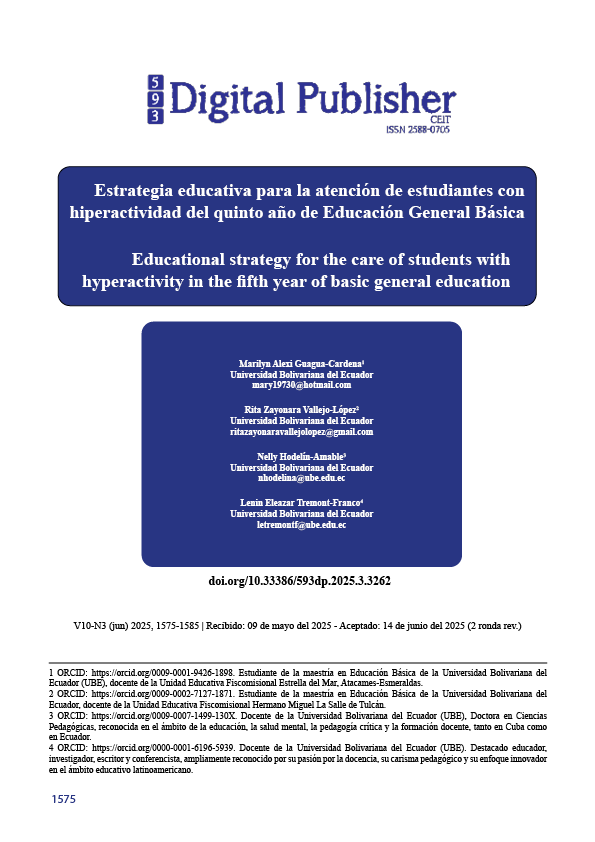Educational strategy for the care of students with hyperactivity in the fifth year of basic general education
Main Article Content
Abstract
This study addresses the design of an educational strategy to address students with hyperactivity, knowing that this is a neurological condition that affects attention and behavior in the classroom, interfering with the learning and social integration of students. The research follows a mixed, descriptive and field approach, developing qualitative and quantitative methods to analyze teacher perception, evaluate current strategies and propose a playful didactic intervention. The findings indicate that teachers have general knowledge about hyperactivity due to a lack of specialized training. The need to apply active methodologies, multisensory learning and the use of technology to improve students' concentration and academic performance was identified. In response, a proposal was designed on three fundamental pillars: training in inclusive methodology, methodological adaptations with multisensory and playful approaches, and interdisciplinary accompaniment with the support of specialists. The strategy was validated using observation techniques, interviews, and surveys, demonstrating improvements in student attention and participation. Thus, the application of playful strategies enhances the teaching-learning process in children with hyperactivity, promoting more inclusive and effective education.
Keywords: hyperactivity, educational strategies, playful teaching, inclusive education
Downloads
Article Details

This work is licensed under a Creative Commons Attribution-NonCommercial-ShareAlike 4.0 International License.
1. Derechos de autor
Las obras que se publican en 593 Digital Publisher CEIT están sujetas a los siguientes términos:
1.1. 593 Digital Publisher CEIT, conserva los derechos patrimoniales (copyright) de las obras publicadas, favorece y permite la reutilización de las mismas bajo la licencia Licencia Creative Commons 4.0 de Reconocimiento-NoComercial-CompartirIgual 4.0, por lo cual se pueden copiar, usar, difundir, transmitir y exponer públicamente, siempre que:
1.1.a. Se cite la autoría y fuente original de su publicación (revista, editorial, URL).
1.1.b. No se usen para fines comerciales u onerosos.
1.1.c. Se mencione la existencia y especificaciones de esta licencia de uso.
References
Hidalgo Moreira, S. M., & Arteaga Arteaga, M. (2021). Learning strategies for students with attention deficit. Dialnet, 4.
Jordán Rusca, F., & Cortez Vergara, C. (2020). Attention Deficit and Hyperactivity Disorder in children and adolescents. A clinical review. SciELO, 2.
Mera, Z. (Septiembre de 2024). Estrategias para potenciar las habilidades comunicativas en niños de 3 a 6 años con discapacidad múltiple. Obtenido de Repositorio Institucional de la Universidad Politécnica Salesiana: http://dspace.ups.edu.ec/handle/123456789/27468
Ministerio de Educación. (3 de Mayo de 2016). El nuevo Ecuador. Obtenido de Guía de estrategias pedagógicas para atender necesidades educativas especiales en el aula: https://educacion.gob.ec/
Ministerio de Educación. (3 de Mayo de 2016). El Nuevo Ecuador. Obtenido de Guía de adaptaciones curriculares para educación inclusiva. : https://educacion.gob.ec/
Ministerio de Educación. (12 de Septiembre de 2024). ACUERDO Nro. MINEDUC-MINEDUC-2024-00067-A. Obtenido de https://educacion.gob.ec/wp-content/uploads/downloads/2024/09/MINEDUC-MINEDUC-2024-00067-A.pdf
Morin, A. (29 de Marzo de 2024). Understood. Obtenido de Adaptaciones en el aula para el TDAH : https://www.understood.org/es-mx/articles/classroom-accommodations-for-adhd
Pirona, D. J. (2021). Cienciamatria. Obtenido de Revista Interdisciplinaria de Humanidades, Educación, Ciencia y Tecnología: https://www.cienciamatriarevista.org.ve/index.php/cm/article/view/1273
Sarmiento, D. A. (2021). TÉCNICAS DE RELAJACIÓN PARA MEJORAR EL COMPORTAMIENTO EN. Obtenido de https://dspace.ups.edu.ec/bitstream/123456789/20209/1/UPS-CT009096.pdf
UNESCO. (10 de Febrero de 2024). Obtenido de Glosario de apoyos educativos y ajustes razonables para garantizar la participación plena de estudiantes con discapacidad. : https://www.unesco.org/es/articles/glosario-de-apoyos-educativos-y-ajustes-razonables-para-garantizar-la-participacion-plena-de
Vega Rivera, G. A. (2024). Impact of ADHD on the learning of school-aged students: a systematic review. SciELO, 3.





